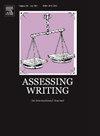The effect of metacognitive instruction with indirect written corrective feedback on secondary students’ engagement and functional adequacy in L2 writing
IF 5.5
1区 文学
Q1 EDUCATION & EDUCATIONAL RESEARCH
引用次数: 0
Abstract
This study explored how metacognitive instruction (MI) combined with indirect written corrective feedback (WCF) influences students’ engagement with WCF and their functional adequacy (FA) in L2 writing. Fifty-four intermediate-level Korean secondary school students participated, divided into a treatment group (WCF + MI) and a comparison group (WCF only). Over 13 weeks, students completed five argumentative writing tasks, receiving WCF after each task. They also completed a self-report survey on their engagement with WCF. Results from the pretest, immediate posttest, and delayed posttest revealed that students in the treatment group showed increased behavioral engagement over time, although this pattern was inconsistent across all engagement dimensions. Overall, FA scores improved significantly across time points, but no significant differences were observed between groups. Furthermore, engagement with WCF did not significantly predict FA performance in either group at either posttest. These findings suggest that pairing MI with WCF may encourage behavioral engagement, but its impact on writing quality remains inconclusive. While preliminary, the results highlight the potential of MI as a tool in the feedback process and suggest the need for further research using broader engagement measures and longer instructional periods to better understand how MI and WCF can jointly support L2 writing development.
间接书面纠正反馈的元认知教学对中学生二语写作投入和功能充分性的影响
本研究探讨元认知教学(MI)结合间接书面纠正反馈(WCF)如何影响学生使用间接书面纠正反馈和他们在第二语言写作中的功能充分性(FA)。54名韩国初中学生被分为治疗组(WCF + MI)和对照组(仅WCF)。在13周的时间里,学生们完成了5个议论文写作任务,每个任务后都得到了WCF。他们还完成了一份关于他们参与WCF的自我报告调查。前测、即时后测和延迟后测的结果显示,随着时间的推移,治疗组的学生表现出越来越多的行为投入,尽管这种模式在所有投入维度上都不一致。总体而言,FA评分在各个时间点上均有显著提高,但组间无显著差异。此外,参与WCF并不能显著预测两组在两个后测中的FA表现。这些发现表明,将MI与WCF相结合可能会促进行为参与,但其对写作质量的影响仍不确定。虽然是初步的,但结果强调了MI作为反馈过程工具的潜力,并建议需要进一步研究,使用更广泛的参与措施和更长的教学时间,以更好地了解MI和WCF如何共同支持第二语言写作的发展。
本文章由计算机程序翻译,如有差异,请以英文原文为准。
求助全文
约1分钟内获得全文
求助全文
来源期刊

Assessing Writing
Multiple-
CiteScore
6.00
自引率
17.90%
发文量
67
期刊介绍:
Assessing Writing is a refereed international journal providing a forum for ideas, research and practice on the assessment of written language. Assessing Writing publishes articles, book reviews, conference reports, and academic exchanges concerning writing assessments of all kinds, including traditional (direct and standardised forms of) testing of writing, alternative performance assessments (such as portfolios), workplace sampling and classroom assessment. The journal focuses on all stages of the writing assessment process, including needs evaluation, assessment creation, implementation, and validation, and test development.
 求助内容:
求助内容: 应助结果提醒方式:
应助结果提醒方式:


